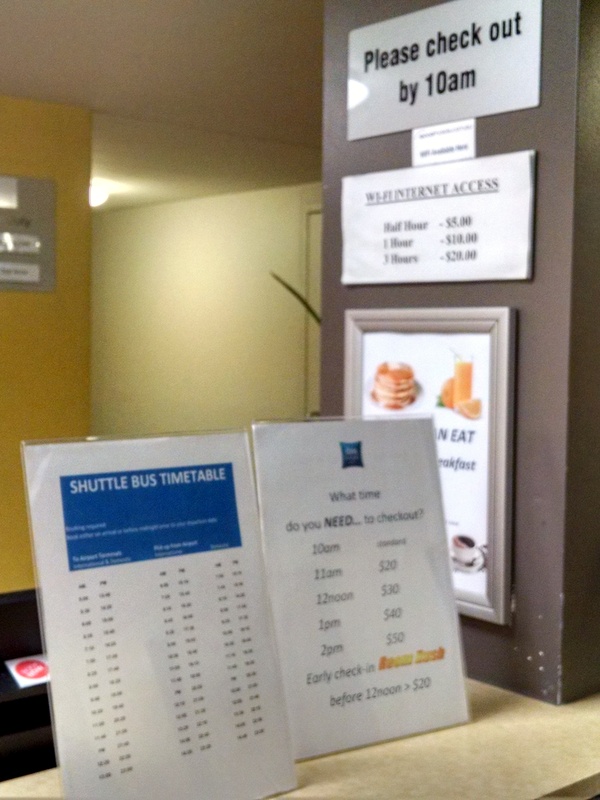Check out our Top Rewards Cards to boost your points earning and travel more!
A traveler to Australia/New Zealand is quickly introduced to fees and add-ons of all kinds, some examples:
- Booking fees on some airline websites
- Fee to connect international and domestic terminals in Sydney (unless connecting to Qantas or Virgin Australia)
- Depending on route, only coffee/tea/water free in flight, with various pre-flight and in-flight upsells for everything else
- Hotels charging for everything from airport shuttles to wi-fi to checking out at noon (instead of 10 am as many set their policy)
- Even the fish and chips place in Norfolk Island charging 60 cents for thimbles of ketchup!
Economists can make the argument that having everything a la carte brings rationality to the transaction. You get what you pay for, no more, no less.
Or you get people to pay a price incorrectly assuming basic services are included, then ream them for more. Such is the case of a hotel like the barracks-esque ibis Budget Sydney Airport that appears slightly cheaper than competitors until you show up and get hit for charge after charge for what the others include.
I don’t like these models for myself because my first thought when hit by a charge such as for wi-fi is to try to make do without or conserve, rather than relax in my stay. With everything so transactional, even more of the personality and hospitality is removed from the travel experience. By the way, I am writing this from Olini Lodge in Tonga where the garrulous caretaker insists guests feel at home and have run of the many fruits of the garden. What a change.
I don’t know the history of Australia/New Zealand in this regard, so I am curious.
Readers:
- How did Australia/New Zealand adopt this extreme a la carte model to pricing in their consumer economy?
- How do Australians/New Zealanders feel when they visit countries where prices are typically more inclusive? Better travel experience or feel they are paying extra for stuff they won’t use?
- How do the rest of you feel when visiting Australia/New Zealand and encounter these charges? Does it make sense irk you?
- US airlines have adopted much of this, will other parts of the US economy move in this direction?
Check Out Our: Top Rewards Cards ¦ Newsletter ¦ Twitter ¦ Facebook ¦ Instagram


@Alice, oh yeah, that too. On my first day in Sydney (the start of a four-day holiday), nothing was open except for Hungry Jacks, and they also had the public holiday surcharge of 10%. Got used to paying that pretty quick. I didn’t like it, but it made sense. I guess not too different from the unbundling that airlines have carried out over the past decade.
There is also typically a surcharge for going to a cafe on a public holiday to offset paying staff extra those days.
[…] me of an article I read this morning over on Rapid Travel Chai on How Did Australia/New Zealand Develop Their Nickel-and-Dime Economy and How Does it Affect the Trave…? So apparently it’s not limited to Australia and New […]
This is a really interesting question. I was there for a few months back in 2003, and don’t remember noticing that much nickel and diming. Then again, I didn’t buy that much. One thing that I find interesting about Australia and the U.K. Is that you get a discount for take-out. Originally I thought this was because they don’t need to pay for the space or waitstaff if people take the food with them. Now, I believe it is also related to VAT being charged different for eat in and take out. In the US you are more likely get… Read more »
Interesting thoughts, but the best was that you’re in Tonga. I’m going in June, so very interested in your trip reports from there.
Having just completed a 2+ week trip to Australia, I agree with all of the above sentiments, but I think the simple answer is the more balanced distribution of income. On the positive side, it is nice to know that the price seen on the restaurant menu is the price you will pay on the final bill. No need to factor in service charges, tips and sales tax. Of course, with the cost of service workers so high, you do encounter shorter opening hours and the occasional bad service… However, I also completely agree about many of the complaints from… Read more »
Interesting. I always regard the USA as the capital of the nickel and dime world. Fully exclusive rates are the norm, with loads of extra fees, charges and taxes added after the customer has bought in. I live in the UK and such practices would simply be illegal. About the only thing where it’s the other way around is credit card charges, which strangely are generally included in the USA but, at least on travel websites, tend not to be in the UK, even though the merchant charges in the UK are significantly lower.
You do realize the Aussie dollar is 0.78 USD? So think of all Aussie prices at 22% discount…
I didn’t find anything unduly expensive in Australia compared to adjusted prices I find in the US when on month-long trip last year. But we used points for most hotels and had status so weren’t nickel and dimed.
Who the H puts ketchup on fish and chips?
@MSer – all the sauces available were 60 cents, I want ketchup for my chips which were plain and dry in contrast to the suburb crumbed local fish.
Part of the reason I went was the exchange rate favorable to me. I did not say I found the country overly expensive, I was there around 2012 at the AUD peak when it was brutal, rather my interest in a different pricing model and how that impacts us psychologically in our travels.
I grew up in Australia, and now live in the USA, so here’s my input: I was shocked when I moved to the US, and discovered that the price of a product (whether it be a clothing item, or something at a restaurant) was not the price one paid for the item, because sales tax is added to the price when checking out. In Australia, the taxes are generally included in the price of the item. I was shocked when I moved to the US that tipping was expected on many things; tipping was/is almost unheard of in Australia; one… Read more »
I would imagine one possible explanation is price elasticity of demand. Australia is so friggin far from everywhere else in the world, and most visitors probably make it a once in a lifetime trip. I would certainly treat my possible future trip that way. So people’s demand for goods/services would be much less elastic (responsive) to change in prices, even if they’re being nickel-and-dimed. And once you’re there, you also don’t have as many choices as you do during the planning phase. Put all that together and you have an environment where businesses can get away with this.
@jay, it’s usually the opposite! 5 star hotels charge $30 for wifi while it’s free at the super 8.
I noticed this too a couple years ago, travelling to NZ and Australia. On a flight from Sydney to Wellington on Air NZ, the seats were 3+3. I was on an aisle seat – the middle seat and the window seat on my side were a mother and a teenage son. On the other side, three seats were empty. After reaching the cruising height, I told my neighbors that ‘you could use some room’, and moved across the assle to an empty seat. A few minutes later, a flight attendant came by and asked me to go back to my… Read more »
Garrulous? Do you mean gregarious?
Booking fees on some airline websites: This is because there is an effective duopoly (Qantas owns Jetstar, Virgin owns Tiger) and the companies can get away with it. Note: the regulator is trying to take action, but they are inept. Fee to connect international and domestic terminals in Sydney (unless connecting to Qantas or Virgin Australia): The airport has been privatised. Have u seen the parking fees being charged at Sydney airport? Depending on route, only coffee/tea/water free in flight, with various pre-flight and in-flight upsells for everything else: Same as United. This is also why, as an Australian, I… Read more »
@Jay – in Australia, you get nickle and dimed and ripped off at every opportunity. I stayed in Westin Sydney once and it was $10 for bottled water and $20 a day for internet. That was 2 years ago. Any attraction / museum was in the $40-60 range, good beer was $10 a pint, and the list goes on. As one Aussie I talked to put it, it’s a Nanny State. They regulate and tax/surcharge everything that can be. A Wyndham hotel near Cairns once asked me for 3% CC surcharge, even though I made the booking specifically on the… Read more »
These hotels are more rubbish than the hotels I stayed at in Vegas when I was broke in college. Choose a Hilton or Hyatt or Starwood or Marriott and everything will be good.
what do you expect from
these rubbish hotels? the cheaper the brand the more of this sort of thing you should expect
I understand that Australians and New Zealanders feel the same when they visit the USA and find they are expected to tip everybody.
My guess is their approach is rooted in their historically egalitarian cultures.
You didn’t mention that they often have a surcharge to use a credit card (particularly at high-end hotels).
I’m Aussie and have lived in the US 10 years. When I go home I notice what a giant rip off Australia is. You land at SYD get a coffee and it’s $6 – then a .50 cent surcharge to pay on credit card. My friends can’t pick me up curbside because SYD airport charges $86 or something insane to even be in the laneway for 5 minutes. I think Aussies are kinda used to be ripped off – and we notice it when we come to the US in particular how cheap and plentiful things are here. Order a… Read more »
My experience is mostly around Australia but it’s always been rather PAYG (that’s “pay as you go” and a fairly well known acronym) My theory is until recently, Aussies and Kiwi’s lived pretty simple but high quality lives — there are social safety nets in place for just about everything and the tax structure ensures that nobody is too rich and nobody is too poor. Luxury goods – including imports of just about every kind — are heavily tarriffed and until the past decade or so, weren’t really realistically attainable. Consequently, pricing was always for the basics of what was… Read more »